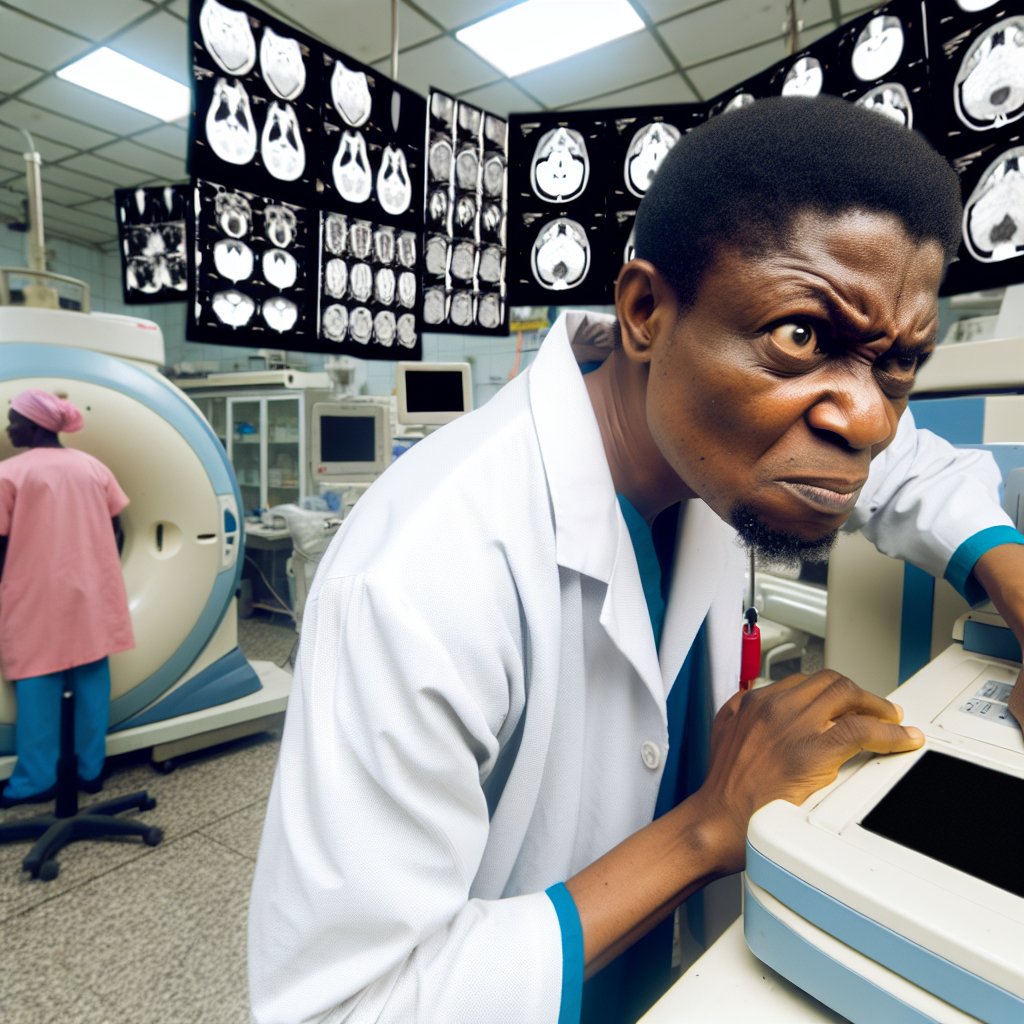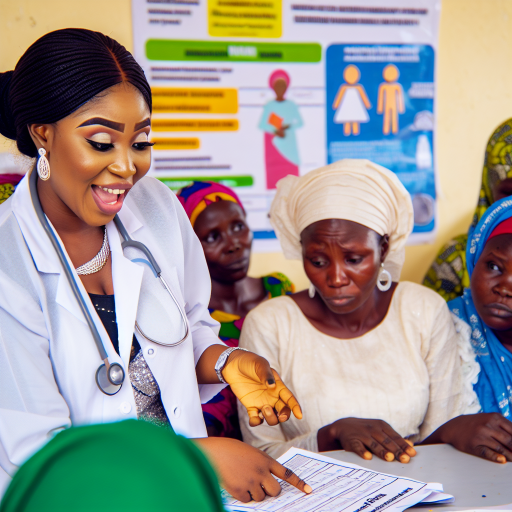Introduction
Radiology in Nigeria has made significant strides in recent years.
The field continues to grow and evolve.
Radiologists play a crucial role in the healthcare system.
They use advanced technology to diagnose and treat various medical conditions.
Brief Overview of Radiology in Nigeria
Radiology in Nigeria has seen impressive advancements in technology and infrastructure.
This progress allows for more accurate and efficient diagnostic imaging.
Importance of Radiologists in the Healthcare System
Radiologists are essential members of the healthcare team.
They provide crucial insights into patients’ conditions.
This is achieved through the interpretation of medical images.
Challenges for Radiologists in Nigeria
One of the major challenges facing radiologists in Nigeria is the lack of adequate training and specialization.
Shortage of training programs for radiologists
One of the key issues faced by radiologists in Nigeria is the limited number of training programs available for those seeking to enter the field.
This shortage of programs makes it difficult for aspiring radiologists to acquire the necessary skills and knowledge to excel in their profession.
Limited opportunities for further specialization
Even for those radiologists who have completed their initial training, there are limited opportunities for further specialization in specific areas of radiology.
This lack of specialized training programs can hinder the ability of radiologists to provide the highest level of care to their patients.
Impact on quality of diagnosis and treatment
The lack of adequate training and specialization among radiologists in Nigeria can have a significant impact on the quality of diagnosis and treatment provided to patients.
Without comprehensive training and ongoing education, radiologists may struggle to accurately interpret imaging tests and provide optimal care.
Addressing the challenges related to training and specialization is crucial for improving the quality of radiology services in Nigeria.
Building more training programs and providing opportunities for further specialization can help ensure that radiologists are equipped to deliver the highest standard of care to their patients.
Challenges in Accessing Advanced Radiology Technology
One of the major challenges facing radiologists in Nigeria is the limited access to advanced technology.
-
High Cost of Acquiring and Maintaining Modern Radiology Equipment
The high cost of purchasing and maintaining modern radiology equipment is a significant barrier for many healthcare facilities in Nigeria.
Due to budget constraints, many hospitals and clinics struggle to afford state-of-the-art machines. This hinders the quality of patient care.
-
Unequal Distribution of Equipment Across Healthcare Facilities
Another challenge is the unequal distribution of radiology equipment across healthcare facilities in Nigeria.
Major cities may have access to advanced technology. Meanwhile, rural areas often lack basic imaging tools, leading to disparities in healthcare services.
-
Impacts Efficiency and Accuracy of Diagnostic Imaging
The limited access to advanced technology and unequal distribution of equipment directly impact the efficiency and accuracy of diagnostic imaging.
Radiologists in under-equipped facilities may struggle to make accurate diagnoses. This potentially puts patients at risk.
Addressing the challenges of limited access to advanced technology in radiology is crucial for improving healthcare services in Nigeria.
By investing in modern equipment, ensuring equal distribution across all facilities, and prioritizing efficiency and accuracy in diagnostic imaging, radiologists can provide better care for patients across the country.
Discover More: Radiology Salary Expectations in Nigeria
Heavy workload and limited workforce
Radiologists in Nigeria are facing challenges due to the heavy workload they have to deal with on a daily basis.
The increasing patient population has put a strain on the healthcare system, leading to a higher demand for radiology services.
Unfortunately, there is an insufficient number of radiologists in the country to meet the growing needs of the population.
As a result, radiologists are often overworked, leading to burnout and fatigue among healthcare professionals in this field.
Impact of increasing patient population
The increasing patient population in Nigeria has led to a higher demand for radiology services across the country.
Radiologists are struggling to keep up with the growing number of patients seeking diagnostic imaging services.
The limited number of radiologists in Nigeria means that there are long waiting times for patients to access these services.
This delay in receiving timely medical care can have serious implications on patient outcomes and overall healthcare delivery in the country.
Addressing the shortage of radiologists
To address the shortage of radiologists in Nigeria, there needs to be a concerted effort to train and recruit more healthcare professionals in this field.
Government and healthcare institutions should invest in creating more training programs and opportunities for aspiring radiologists.
By increasing the number of radiologists in the country, we can improve access to diagnostic imaging services for patients.
Additionally, offering incentives and competitive salaries to radiologists can help retain talent and prevent burnout in the workforce.
Preventing burnout and fatigue among radiologists
Burnout and fatigue are common challenges faced by radiologists in Nigeria due to heavy workloads and limited resources.
To prevent burnout, healthcare institutions should implement strategies to support the mental and physical well-being of radiologists.
Providing resources for stress management, regular breaks, and a supportive work environment can help prevent burnout among radiologists.
It is crucial to prioritize the health and well-being of radiologists to ensure the delivery of quality healthcare services to patients in Nigeria.
You Might Also Like: Importance of Medical Biochemistry in Nigeria’s Health Sector
Challenges Facing Radiologists in Nigeria
One of the major challenges facing radiologists in Nigeria is inadequate infrastructure and support services.
Transform Your Career with Expert Guidance
Get personalized mentorship consulting that’s tailored to your unique path. Our expert advice is actionable and exclusive.
Get StartedPoorly Equipped Radiology Departments
Many radiology departments in Nigeria lack modern equipment and technology needed for accurate diagnosis and treatment.
Lack of Support Staff Such as Radiology Technologists
There is a shortage of trained and qualified radiology technologists in Nigeria.
This shortage leads to increased workload for radiologists.
Impacts on Efficiency and Quality of Patient Care
The lack of infrastructure and support services in radiology departments directly affects the efficiency and quality of patient care.
Patients may experience delays in getting their results, misdiagnosis, or inadequate treatment due to these challenges.
Moreover, the limited resources and support staff hinder radiologists from providing timely and accurate diagnoses.
This situation greatly impacts patient outcomes.
Without proper infrastructure and support services, radiologists struggle to meet the growing demand for diagnostic imaging services in Nigeria.
Efforts must be made to improve the working conditions and resources available to radiologists.
This improvement is essential to enhance patient care and outcomes.
Gain More Insights: Impact of Nigerian Culture on Dietetics Practices

Lack of standardized practices and regulations
Radiologists in Nigeria face numerous challenges in their day-to-day practice. One of the most significant challenges is the lack of standardized practices and regulations in the field.
This lack of uniformity can lead to variations in the quality of radiology services provided to patients. Additionally, inconsistencies in reporting and interpretation of imaging results can arise.
One of the major consequences of this lack of standardization is the challenge in maintaining standards of care across different healthcare facilities.
Without clear guidelines and regulations in place, radiologists may struggle to ensure they are providing the highest level of care to their patients.
For example, radiologists may encounter difficulties in ensuring that imaging equipment is properly calibrated and maintained.
Proper calibration is essential for accurate and reliable results. Without standardized practices in place, variations in the calibration of equipment may lead to discrepancies in imaging findings.
Furthermore, the lack of standardized reporting practices can pose challenges for radiologists in effectively communicating their findings to other healthcare professionals.
Inconsistencies in reporting can lead to misunderstandings and misinterpretations of imaging results. This situation can potentially compromise patient care.
Overall, the lack of standardized practices and regulations in radiology in Nigeria presents significant challenges for radiologists.
Addressing these issues will be essential in improving the quality and consistency of radiology services in the country.
- Variation in quality of radiology services
- Inconsistencies in reporting and interpretation
- Challenges in maintaining standards of care
You Might Also Like: Volunteer Opportunities for Radiography Students in Nigeria
Financial constraints and reimbursement issues
- Low government funding for healthcare
- Limited insurance coverage for radiology services
- Financial burden on patients
Radiologists in Nigeria face significant challenges when it comes to financial constraints and reimbursement issues.
The lack of adequate government funding for healthcare in the country has a direct impact on the availability and quality of radiology services.
This results in a shortage of equipment, outdated technology, and limited access to training and education for radiologists.
Furthermore, the limited insurance coverage for radiology services adds to the financial strain on both radiologists and patients.
Without proper insurance reimbursement, radiologists are often forced to charge higher fees for their services.
This makes it difficult for patients to afford essential diagnostic procedures.
This ultimately leads to delayed diagnoses and treatment, putting patients’ health at risk.
Effects of financial constraints on radiologists
The financial constraints in Nigeria also affect radiologists directly, as they struggle to maintain a sustainable practice in the face of rising costs and limited reimbursement.
This can lead to burnout, job dissatisfaction, and a high turnover rate within the field of radiology.
Many radiologists are forced to work long hours and take on additional responsibilities to make ends meet.
This can negatively impact their overall well-being and quality of patient care.
Strategies to address financial challenges
Despite these challenges, there are strategies that radiologists in Nigeria can implement to address financial constraints and reimbursement issues.
One approach is to advocate for increased government funding for healthcare, specifically targeting investments in radiology equipment and infrastructure.
By raising awareness about the importance of radiology in patient care, radiologists can push for policy changes that prioritize the improvement of radiology services across the country.
Additionally, radiologists can work towards building stronger relationships with insurance providers to negotiate better reimbursement rates for their services.
By demonstrating the value and impact of radiology in healthcare delivery, radiologists can make a case for fair and reasonable payment for their expertise.
This can help alleviate the financial burden on both radiologists and patients, ultimately improving access to essential diagnostic services.
Challenges in Radiology Services
Radiologists in Nigeria face numerous challenges including inadequate training, limited resources, and poor infrastructure.
There is a pressing need for increased support and investment in radiology services to address these challenges effectively.
By addressing these challenges, we can improve healthcare outcomes, provide better diagnoses, and ultimately save more lives in Nigeria.
Additional Resources
Designing Participatory Needs Assessments to Support Global …
Emeritus Professor Ifeoma Okoye MBBS, FWACS, FMCR – Director …




